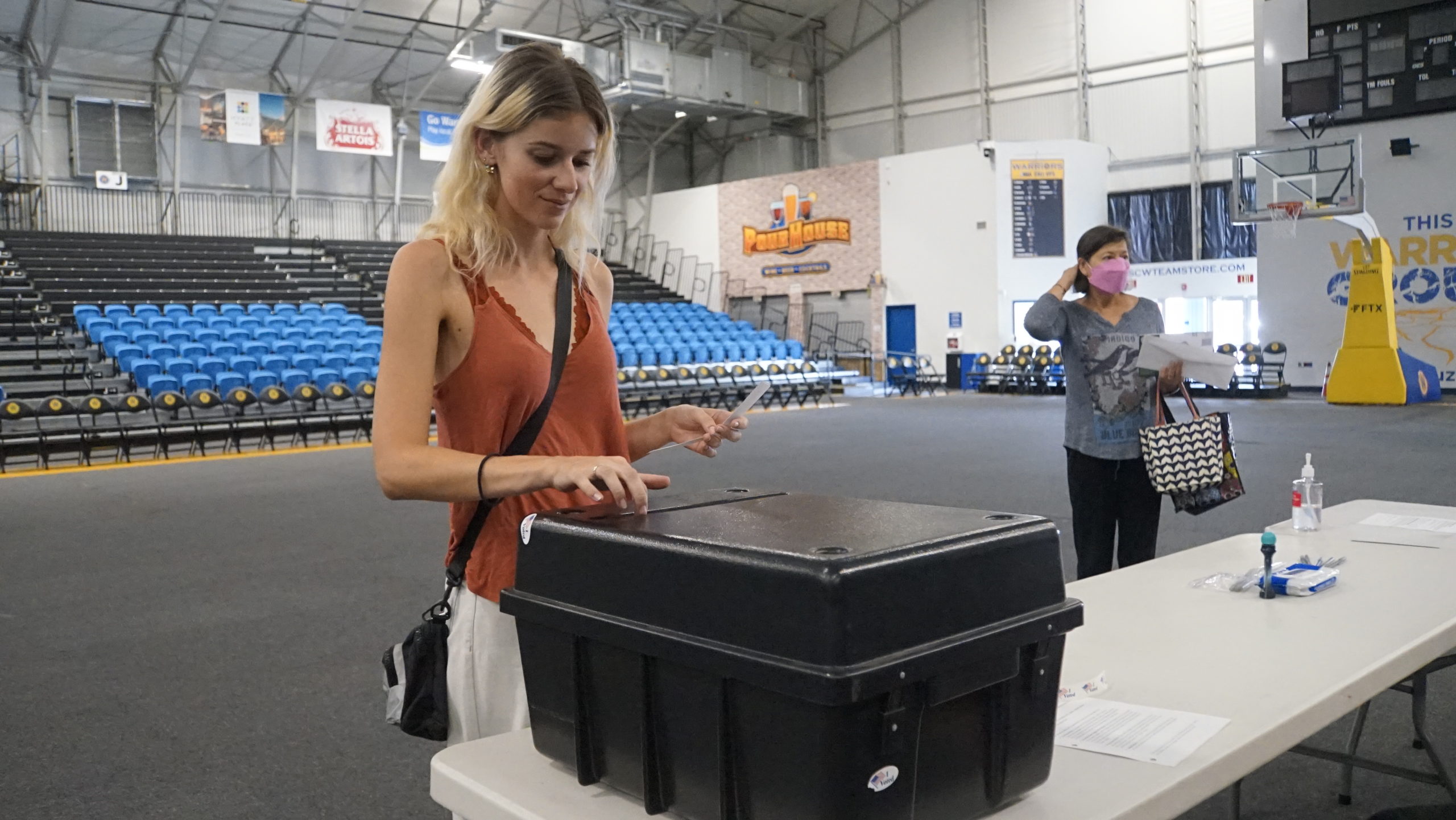
Santa Cruz resident Mira Laiho casts her ballot Tuesday at Kaiser Permanente arena in Santa Cruz. (Kara Meyberg Guzman — Santa Cruz Local)
B - County Hotel & Vacation Rental Tax
| Vote | Total | |
|---|---|---|
| Yes | 52823 (69.23%) | |
| No | 23478 (30.77%) | |
C - County Tax on Disposable Cups
| Vote | Total | |
|---|---|---|
| Yes | 52957 (69.64%) | |
| No | 23082 (30.36%) | |
E - City of Santa Cruz District Elections
| Vote | Total | |
|---|---|---|
| Yes | 11490 (66.55%) | |
| No | 5774 (33.45%) | |
F - City of Santa Cruz Sales Tax Hike
| Vote | Total | |
|---|---|---|
| Yes | 8563 (49.85%) | |
| No | 8613 (50.15%) | |
SANTA CRUZ >> A ballot measure to increase the City of Santa Cruz’s sales tax fell short of the majority needed for approval, according to official results released July 5 from the Santa Cruz County Clerk’s Office. Other local measures B, C and E were approved.
- Measure B will raise a tax on hotels and vacation rentals in unincorporated areas of Santa Cruz County.
- Measure C will split a 25-cent charge on disposable cups in unincorporated area of Santa Cruz County to give half to the county’s General Fund.
- Measure E will split the City of Santa Cruz into six council districts and create a directly elected mayor.
- Measure F would have raised the City of Santa Cruz’s sales tax to 9.75% from 9.25%. Measure F failed with 49.85% of city voters in favor.
Each measure needed more than 50% of the vote to pass.
Measure B: County hotel and vacation rental tax
Measure B will increase the tax on stays in hotels, motels, inns, and other commercial lodging in unincorporated areas of Santa Cruz County to 12%. The tax is now 11%. Measure B also raises the tax on vacation-rental stays to 14% from 11%.
Measure B is expected to generate an additional $2.3 million annually, county leaders said. The money is not legally bound to be spent on a specific service, but it aims to fund “wildfire prevention, emergency response and recovery, street repair, public and mental health services, homelessness programs, and affordable housing,” according to a county resolution.
Measure B was decided by Santa Cruz County voters, including those who live in the four cities.
Measure C: County tax on disposable cups
To try to reduce waste in landfills, a 25-cent charge on disposable cups is set to go into effect in unincorporated areas of Santa Cruz County on July 1. Measure C will allow the County of Santa Cruz to collect half of each 25-cent disposable cup charge. The other half of the 25-cent disposable cup charge will be retained by the beverage seller.
- The cup charge is set to start July 1 regardless of Measure C’s outcome. With Measure C’s approval, the county’s share of the cup charge is estimated to generate $700,000 annually for the county’s General Fund. The county would not start to collect its share until Jan. 1, 2023.
- If Measure C was not approved, the entire 25-cent cup charge would have been retained by the cup seller.
Measure E: City of Santa Cruz district elections
Measure E will change the City of Santa Cruz’s charter to allow district elections for the Santa Cruz City Council with six districts and a directly-elected mayor. The mayor will represent the entire city for a four-year term.
Santa Cruz now has at-large elections where residents from anywhere in the city can vote for any candidate. With Measure E’s approval, the city will be divided into six geographical districts. Voters in each district would choose a council member who lives in their district.
With Measure E’s approval:
- A directly-elected mayor will represent the entire city.
- Measure E’s passage will let city voters, instead of the council, choose the mayor.
- Measure E’s passage will create a four-year mayoral term. Mayors now serve for one year.
- Measure E will create new term limits. Council members who have served for two consecutive four-year terms would still have to wait two years to become eligible to run again. However, the new rules would allow council members to run for mayor immediately after two terms as a council member.
Measure E does not increase the mayor’s power, role or salary, the city attorney and a city spokeswoman said. The mayor would have the same power to set meeting agendas. The mayor would have the same “primary but not exclusive” responsibility to interpret policies, programs and needs of city government, according to the measure.
The rules will take effect in the Nov. 8 election, since Measure E’s results were certified before a July 6 deadline.
If Measure E failed, the city would have been split into seven geographical council districts. The mayor would have represented their district and would continue to be appointed annually by a council vote. The mayor’s power and salary would remain the same.
Measure F: City of Santa Cruz sales tax hike
Measure F would have allowed the City of Santa Cruz to raise its sales tax to 9.75%. The city’s current sales tax is 9.25%. Money from the tax hike would have been added to the City of Santa Cruz’s General Fund.
Measure F was decided by voters in the City of Santa Cruz. The new tax was expected to start Oct. 1 if adopted by voters, said Santa Cruz city spokeswoman Elizabeth Smith.
Santa Cruz city leaders proposed Measure F largely because the city has a structural deficit. Its expenses are more than its revenue.
Santa Cruz’s budget problems predate the pandemic and are partly caused by rising pension and health care costs for public employees, former city finance directors have said.
Santa Cruz Local’s news is free. We believe that high-quality local news is crucial to democracy. We depend on locals like you to make a meaningful contribution so everyone can access our news. Learn about membership.
Kara Meyberg Guzman is the CEO and co-founder of Santa Cruz Local. Prior to Santa Cruz Local, she served as the Santa Cruz Sentinel’s managing editor. She has a biology degree from Stanford University and lives in Santa Cruz.





